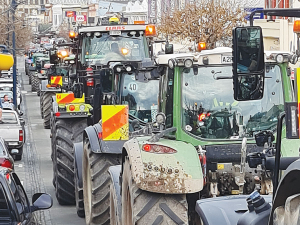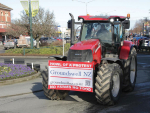OPINION: Groundswell is not against climate policy, or a pricing mechanism to manage farm emissions.
However, we are against the continued misrepresentation of methane's contribution to climate change. We believe this is a deliberate ploy by the Government to force farmers to reduce our emissions well below what the science says is required.
Methane is a short-lived greenhouse gas. If it can be stabilised in the atmosphere, it will no longer contribute to warming. A farmer with stabilised methane emissions is no different to a net zero CO2 emitter who has offset 100% of their emissions - both are climate neutral processes.
But under current policy proposals, they will be treated very differently. The net-zero CO2 emitter will pay no emissions tax, while the farmer will not only pay a tax on these emissions, but also be incorrectly blamed for continuing to be part of the problem. This is not fair and equitable climate policy.
The solution to this misrepresentation of methane is to base policy on warming effect. This way, farmers could be held accountable for any contribution they make to climate change, but it would ensure we are not taxed on emissions that are not adding to warming.
The Government has roundly rejected this approach, but not only that - it refuses to allow any reference to warming effect from being included in emissions policy. The Government has painted itself into a corner. If it allows farmers to accurately measure their impact on clmate, it will show that the current Zero Carbon Act's methane reduction target of 10% by 2030 is grossly excessive.
The IPCC has concluded that a 0.3% per year reduction in methane emissions can offset any further warming from a steady flow source, such as a farm. This incremental reduction is required to offset any GHGs which remain in the atmosphere after the decay process. Farmers could ensure no further warming from methane by reducing their emissions by around 3% by 2030, this is a full 7% less than what the Government is demanding.
Even the 'independent' Climate Change Commission has refused to comment on the discrepancy between the reductions required to be warming neutral and the Zero Carbon Act's 10% target. Farmers are being left to conclude that our industry's actual contribution to climate change is irrelevant. We are being asked to reduce our stock numbers, sacrificing the long-term sustainability of many businesses, based on incomplete emissions reporting.
We have the tools at our disposal to correctly measure warming from methane. The new GWP* metric is designed to do just that. A political decision appears to have been made to suppress this information from both farmers and the public.
Warming effect is important - the entire purpose of our country's climate policy is to limit global warming to 1.5 degrees Celsius. Not measuring agriculture's warming effect may be politically convenient, but it defies all logic.
This has put farmers in a regulatory predicament. If we push for a more science-based approach to emissions pricing, we risk the Government withdrawing from the He Waka Eke Noa process completely and throwing agriculture into the ETS at processor level. This threat has been made very clear to us.
Our traditional advocacy group representatives have already capitulated to this and are now largely pushing the Government policy agenda. An emissions tax at processor level would be damaging to the industry and achieve nothing in the way of behavioural change.
The current policy will harm many rural communities by slowly pricing farmers out of the market to make way for carbon forestry. We accept the need for emissions regulation and are willing to play our part in limiting any further climate change from our industry.
We ask that the Government works with us; together we can turn agriculture into our first major climate neutral industry.
Supplied by Groundswell.



















